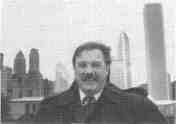 |
Home | Search | Browse | About IPO | Staff | Links |
 |
Home | Search | Browse | About IPO | Staff | Links |
|
A VIEW FROM CHICAGO


by James Ylisela Jr.
I grew up in south suburban Homewood in the late-1960s. Homewood
was, as they used to say, "lily white."
Everyone in my elementary school was
white; a few Jewish kids were about as
exotic as we got. There were rumors of
black people in Harvey, to the north,
but I never saw them.
My high school had one black student, who was two years ahead of me.
His father was a doctor, and the family
lived in swanky Olympia Fields. He
was a star on the wrestling team and,
because he was black, everyone treated
him like a celebrity. I never knew how
he felt about it.
Chicago was the great unknown, a
place for field trips to the museum and
Lincoln Park Zoo and the occasional
Cubs or White Sox game. Having
moved from Ohio, I looked in awe at
the big city and craved more.
I didn't realize that many suburban
families had already seen enough.
They looked back at the city like
parolees look at prison — safely away,
but never quite far enough. One friend
told me her family had moved from an
idyllic sounding place called "South Shore." I didn't realize then that they
had been part of the great outward
migration known as "white flight," and
that South Shore had turned from
white to black in the blink of an eye.
By the time I moved to Chicago in
the mid-1970s, white flight had been
going strong for 20 years. And two
decades of mass exodus had bred a
sense of alienation between city and
suburbs. It was us against them. The
Urban Jungle versus the Village Green.
Anything good for Chicago was bad
for the suburbs, and vice versa.
But there is change in the air. In the
first glimpse at Cook County's population at mid-decade. The Chicago
Reporter discovered one startling statistic: White flight has slowed to a
crawl. Chicago's white population loss
is at its lowest level since the 1950s.
What's more, blacks, Latinos and
Asians are fanning into the suburbs.
Yet, while the color lines grow fuzzier,
the old animosity lingers. Chicago still
treats the suburbs like traitors or poor
relations. And, while suburban Cook
may look more like Chicago, its leaders still act like they live in DuPage.
Still, with a little inspiration, the
leaders of Chicago and suburban
Cook might actually work together to
solve three nagging problems that
plague the region:
The third airport. While Mayor
Richard M. Daley fights the DuPagers
over airport authorities, newly elected
U.S. Rep. Jesse Jackson Jr. is making
the Peotone airport one of his first priorities. Why? Because a big chunk of
Jackson's 2nd Congressional District is
now in the suburbs, and many of his
constituents are black. They would
benefit from the economic activity
generated by a major airport in their
neighborhood. Instead of fighting
over O'Hare, Daley and suburban
leaders should get cracking on a third
airport that benefits the entire region.
School funding. This is always treated as a Chicago issue, but many suburban school districts are equally desperate for dollars. South suburban Harvey
has the highest tax rate in the region,
but because its property values are low,
the schools can't keep pace. Wealthier
municipalities are screaming for property tax relief. Hiking the state income
tax and lessening the reliance on property taxes would benefit Chicago and
suburban schools alike.
McDome. Daley no longer flatly
rejects the idea of a domed stadium for
the Bears, but he'd like the suburbs to
assume some of the tax burden. Gov.
Jim Edgar and GOP leaders respond
with a knee-jerk no, but why not let
fans throughout Cook County help
keep the Bears where they belong?
Let's tally the score. Daley would
get points for keeping the Bears in
Chicago and bringing more state aid
to the schools. Edgar and the Republicans would get an airport and provide
real property tax relief.
Alas, it's a political year, and the
experts say the politicians aren't likely
to do anything, especially if it involves
bold thinking and your tax dollars.
That's probably true. But those same
politicians better start paying attention
to the people they think they represent. One day they may wake up to
find that they don't live there anymore.
James Ylisela Jr. teaches urban reporting
at Northwestern Medill School of Journalism. He's the consulting editor of The
Chicago Reporter, an investigative monthly
that focuses on race and poverty.
Illinois Issues February 1996 * 41 |
|
Sam S. Manivong, Illinois Periodicals Online Coordinator |